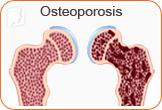
There is life after menopause. In this stage of life, it's more important than ever to actively protect your health because women over 50 are at greater risk of getting osteoporosis, cardiovascular disease, and diabetes. Read on to find out more about irregular heartbeat during menopause.
Staying Healthy After Menopause
In order to stay healthy after menopause, you should be aware of the health risks that pose a threat to your well-being and the steps you can to help preventing them. Keep reading below to learn about the top three health risks in postmenopausal women.
Osteoporosis

Causing bones to become brittle and weak, osteoporosis is one of the leading health risks developed by postmenopausal women. Since estrogen helps contribute to bone strength in younger women, drops in estrogen production increase the risk of developing osteoporosis. The body parts most at risk for fracture include the hips, spine and wrists. Try these tips to keep your bones healthy and strong:
Pump Iron - Weight bearing exercises such as weight-lifting and walking promote strong bones while exercises to improve strength and balance can help protect your bones during a fall.
Soak up Some Rays - Vitamin D helps the body absorb calcium. As little as 5 minutes in the sun a few times a week can help your body produce vitamin D and soak up calcium more willingly.
Diet - Eating foods rich in calcium and vitamin D such as milk, salmon, eggs and dark green leafy vegetables are good choices to help promote strong bones and prevent osteoporosis.
Diabetes

Since the risk of developing type 2 diabetes increases for postmenopausal women, maintaining a healthy diet free of trans-fats and sugars is vital to control blood sugar. Diabetes prevents your body from processing glucose and creates a host of health concerns, including eye and kidney problems. To prevent or manage diabetes, try these tips:
Know the numbers - Diabetics must keep their blood sugar level within the healthy range by eating a high-fiber, low-carb diet, and staying active.
Maintain your weight - Obesity is the primary risk factor for type 2 diabetes. Make regular checkups with your doctor to discuss your ideal weight and learn how to maintain an active and healthy lifestyle.
Cardiovascular Disease
Researchers believe estrogen helps fight against heart disease. However, after menopause, the risk of heart disease increases. There are ways to help lower the risk. They include:
Lowering cholesterol - Studies have found that menopause can cause “bad” cholesterol to increase by as much as 9% within two years of a woman's final period. Regular exercise and eating a low fat diet devoid of hydrogenated oils and trans-fatty acids will help you reduce your risk.
Don't smoke - Smokers are twice as likely to suffer from a heart attack. When a woman stops smoking, the risk of heart disease decreases considerably.
Learn to look forward to enjoying life after menopause by following these simple tips for a more healthy you. Click here to find out more information about menopause treatments.
Sources
- BMJ Group. "Menopause: What is it?" Patient Leaflet. 2007.
- Hutchinson, S. MD. "The Stages of a Woman's Life: Menstration, Pregnancy, Nursing, Premenopause, Menopause." November 2007.
- Love, S. MD. Menopause and Hormone Book. New York: Three Rivers Press, 2003.


